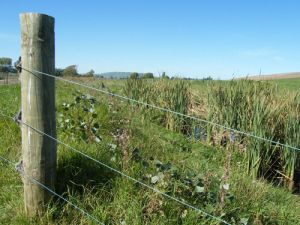Meat Industry Association CEO to Step Down
The Meat Industry Association of New Zealand (MIA) today announced that Chief Executive Officer Sirma Karapeeva has resigned from the role.
 New freshwater reforms will result in 56,000 km more fences protecting New Zealand waterways from stock.
New freshwater reforms will result in 56,000 km more fences protecting New Zealand waterways from stock.
New freshwater reforms will result in 56,000 km more fences protecting New Zealand waterways from stock – enough to go round the world one and a half times, says Primary Industries Minister Nathan Guy.
The new rules on stock exclusion are part of the Government’s plans announced today setting a target for 90% of rivers and lakes to be swimmable by 2040.
“Farmers have made huge progress in recent years to improve their environmental practices and this will be another important step forward. Dairy farmers have already voluntarily fenced off over 24,000km of waterways,” says Guy.
“We know that stock standing in or regularly crossing waterways can do significant damage. While dairy farmers have voluntarily fenced off around 96% of their waterways, we want to extend this to other types of farms as well,” says Guy.
The proposed national regulation would ensure that dairy cattle, beef cattle, pigs and deer are kept out of waterways.
He says we need to ensure the changes are practical for farmers, so the exclusions would be implemented in a staged process starting this year through to 2030, depending on the stock type and land slope.
“There are long term benefits for the primary industries and wider economy from these reforms. Overseas markets and consumers increasingly demand a strong environmental performance over and above regulatory requirements. In this context, protecting New Zealand’s natural advantage has never been more important.
“No single organisation or group is solely responsible for improving our water quality. Meeting the target will take a collective effort, but the primary industries have a key contribution to make.”
In the meantime, the Ministry for Primary Industries continues to work with the primary sectors to invest in good ideas which promote environmental best practice. One example is the Farm Systems Change program, which identifies high preforming farms and uses farmers’ networks to spread their knowledge.
Another is a major programme under the Primary Growth Partnership, called Transforming the Dairy Value Chain. Under this programme effluent management systems have been improved, and every region now has a riparian planting guideline developed in conjunction with regional councils.
Castle Ridge Station has been named the Regional Supreme Winner at the Canterbury Ballance Farm Environment Awards.
The South Island Dairy Event has announced Jessica Findlay as the recipient of the BrightSIDE Scholarship Programme, recognising her commitment to furthering her education and future career in the New Zealand dairy industry.
New Zealand and Chile have signed a new arrangement designed to boost agricultural cooperation and drive sector success.
New DairyNZ research will help farmers mitigate the impacts of heat stress on herds in high-risk regions of the country.
Budou are being picked now in Bridge Pā, the most intense and exciting time of the year for the Greencollar team – and the harvest of the finest eating grapes is weeks earlier than expected.
The Real Estate Institute of New Zealand (REINZ) has released its latest rural property report, providing a detailed view of New Zealand’s rural real estate market for the 12 months ending December 2025.

OPINION: A mate of yours truly reckons rural Manawatu families are the latest to suffer under what he calls the…
OPINION: If old Winston Peters thinks building trade relations with new nations, such as India, isn't a necessary investment in…